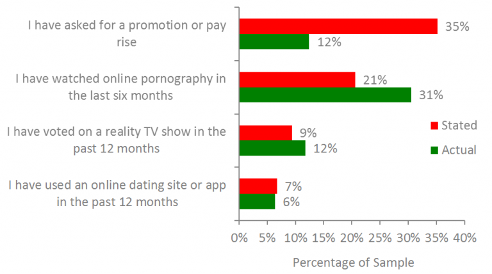Chances Are: Asking for a Pay Rise
Posted: 10/03/2016

“Would you like a 10% pay rise? Maybe you should ask”

Here at Dectech we don’t often believe what people tell us. It’s nothing personal. Decades of behavioural research shows that it’s better to trust what people do rather than what they say. This is particularly important when their responses have social significance. If the truth is potentially embarrassing, then people tend to project a more favourable image of themselves.
So people lie to researchers about their alcohol drinking, ethical purchasing and Tory voting. But there is a method called the ‘unmatched count technique’ that can unearth the truth. This involves questioning people in a way that anonymises their individual answer but allows us to recover the underlying rate across the population at large (see here for details).
The financial year-end on 31st March brings to a close the annual performance and compensation review season at many companies. We investigated whether people are actually prepared to ask for a promotion or a pay rise by questioning some people directly and others using the unmatched count technique. The results are shown in the graphic alongside other behaviours we’ve studied previously. There are two interesting insights.
First, people tend to exaggerate rather than deny their job bravura. 35% of people claim to have asked for a raise whilst only 12% have actually done so. As such whilst people understate, for example, their pornography usage, they overstate their willingness to confront an employer.
Second, money really is more taboo than sex. Whilst ten percent of people lie about viewing online pornography, an astonishing 23% lie about asking for a pay rise or promotion. This is the largest discrepancy between claimed and real behaviour we’ve measured to date, though we have yet to study who is buying Kanye West’s albums.